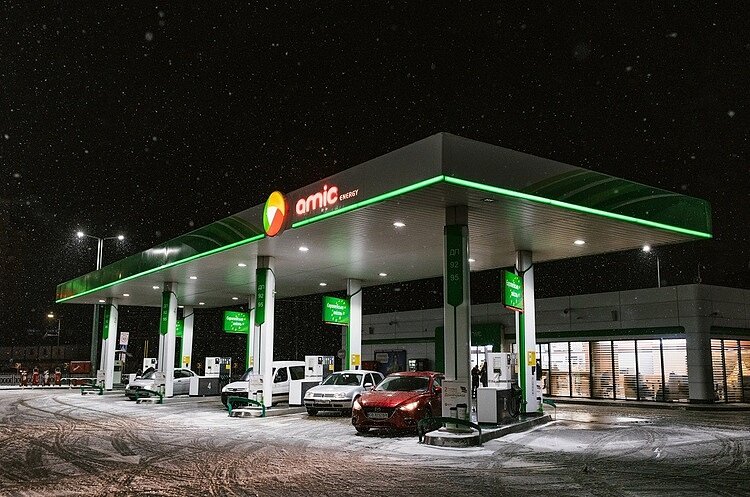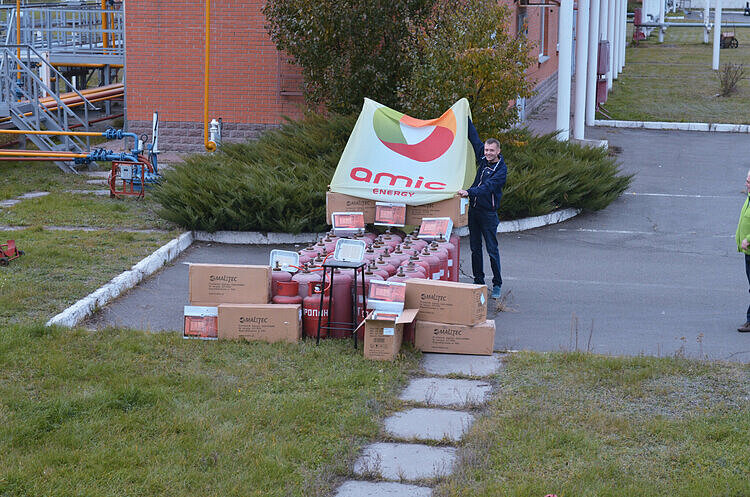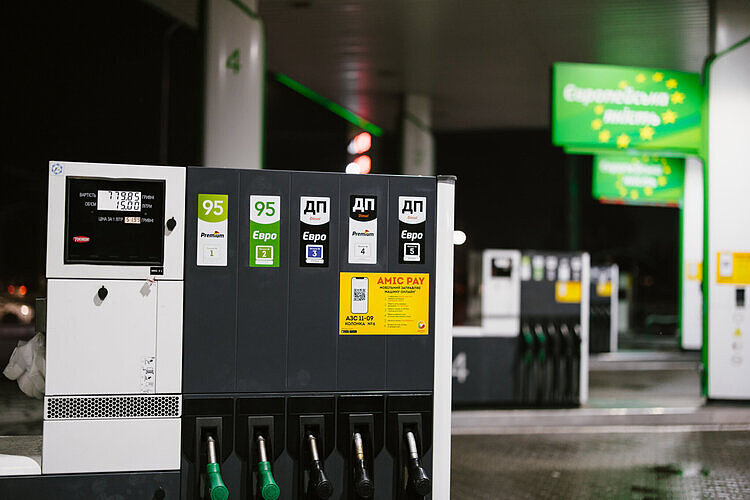Solving staffing problems, daily forecasts and untouchable stocks - what AMIC Energy does to get ahead of new deficits

On 24 February, Ukraine lost not only peace and quiet, but also 97% of external supplies of petroleum products, according to the Ministry of Economy. The destruction of the fuel market infrastructure - refineries, oil depots, a large part of petrol stations - became the country's new challenge amid the aggressor's large-scale invasion.
In March, russian troops targeted oil depots with missile attacks. Oil depots in the regions of Kyiv, Lviv, Volyn, Rivne, Poltava, Dnipropetrovsk and Odesa were destroyed or damaged. By destroying more than 20 oil depots on the territory of the country, the enemy tried to cause a fuel shortage. As a result of the missile attacks, the infrastructure of the Kremenchuk oil refinery was destroyed, the largest petroleum products manufacturing company in Ukraine, which supplied more than a third of the total Ukrainian fuel market and was one of the main suppliers of petroleum products.
Mind spoke to Audrius Stropus, CEO of AMIC Ukraine, and found out what challenges AMIC Energy faced in Ukraine, how they solved them and what the company's plans are for the future.
AMIC Energy’s know-how: Flexible administration, customer-oriented approach, and prudence
At the beginning of February 2022, AMIC Ukraine operated 227 petrol stations, three oil depots and technical service stations at the international airports of Odesa, Boryspil and Kharkiv. AMIC did not intend to buy new petrol stations in 2022, but to completely rebuild the stations in Vorzel and Dymerka to create comfortable modern units in place of the old ones. The company also saw the potential for growth in the aviation market and considered buying new filling stations for international airports to increase the speed and number of aircraft refuelling. The entire transformation had to be postponed, but the company did not stop investing in the growth of petrol stations and petrol station businesses and also creating jobs.
Instead, it was necessary to adapt quickly to the new realities. First and foremost, to the changes in the management of business processes.
"We understood that we could not survive if we did not delegate authority to local managers, because very often decisions had to be made single-handedly and immediately," says Audrius Stropus. "There was no time for collective decision-making. The new reality could not stand up to the earlier long discussions. We had to survive to win."
However, the crisis showed that the established management system was flexible enough to adapt quickly to unforeseen circumstances.
This allowed the company to stop being distracted by processes and was able to make unconventional decisions quickly and try to meet customers' needs for fuel, food, water and even heat and electricity as much as possible. "Since the first days of the large-scale invasion, the petrol stations themselves have remained places of refuge for many Ukrainians, who have been able to find everything they needed here and even stay at the petrol station if they are caught by the curfew there," said the general director of AMIC Ukraine. "The employees of AMIC are constantly meeting the needs of customers in difficult situations."
There are many examples of this. The staff took all the difficulties during the fuel crisis with understanding, tried to explain to customers the necessity and importance of supplying petroleum products to all those in need, albeit in limited quantities. In order to prevent the emergence of a black market during the fuel crisis, it was forbidden for a certain period of time to sell fuel in jerry cans, barrels and other containers that would allow the resale of petroleum products at the AMIC Energy petrol station in Ukraine.
In addition, during the period of high demand, the company increased the number of customer service staff in order to organise quick feedback to the customer.
Like most Ukrainian companies, AMIC faced a staffing problem. "From the very first days we understood that first and foremost we had to ensure the safety of our employees and preserve all jobs," says Audrius Stropus. "And even though there were times when up to 55% of the network's petrol stations were not working, we paid the wages of all our staff without any problems." The most difficult part was ensuring the physical presence of the staff at the petrol station. The company provided transport for staff to and from the petrol station when workers could not get to work due to lack of public transport.
In some regions, almost all workers were evacuated to safer places, making it almost impossible to operate the petrol stations. Therefore, the office workers and regional managers who remained in these areas went to work at the petrol stations and took over the duties of the line staff: dispensing fuel to emergency services and military units and serving customers.

In the spring, a separate refuelling system was set up for hauliers or logistics companies and a compulsory reserve of diesel fuel at the filling station so that difficulties with fuel would not become a humanitarian disaster for the country; after all, much depended on the availability of fuel at the time, including
- the delivery of essential supplies to the army and civilian population,
- the performance of duties by representatives of critical infrastructure (fire brigades, hospitals and ambulances, military administrations, bread factories and others),
- sowing campaign.
Not just a duty: salaries for soldiers, support for the Armed Forces and "invincible coffee" for the liberated South and East
Despite the aforementioned losses and problems, AMIC Energy has supported Ukraine's Armed Forces since the first days of the war. During this time, the company handed over personal protective equipment, vehicles and fuel to about 200 recipients: units of the Armed Forces of Ukraine, the Ukrainian Security Service, the State Border Guard Service of Ukraine, local administrations, patrol police, ambulances, etc.
The company supports on a charitable basis the 242nd Separate Territorial Defence Battalion of the Ukrainian Armed Forces and other military units in which the company's employees serve. During the war, the following were provided for the needs of the battalion: 4 quadcopters, 12 thermal imaging cameras, 12 binoculars, 10 units of Bandera Power 225 S multi-channel chargers, 12 protected tablets, 4 TV sets, 10 Wi-Fi access points, 150 gas heaters, more than 150 units of winter clothing and footwear, a hardware complex for suppression of UAV control channels ANTIDRON KVSG 6+. The company continues to pay the average wage to each mobilised employee, although the state has exempted employers from paying wages to mobilised employees from 19 July 2022.
Currently, the company fully supplies fuel to the charity "Razom for Ukraine” which delivers goods to the front line for the Armed Forces.

In addition, "AMIC Ukraine" has launched a charity campaign "Invincible Coffee" from 1 December 2022, in which the company will transfer two hryvnias from every cup of coffee sold for the reconstruction of Kherson, Zaporizhzhia, Luhansk and Donetsk regions. Every petrol station visitor can not only warm up, but also contribute to the reconstruction of the country by trying the quality coffee at the petrol stations of AMIC Energy.
Other branches of the AMIC Energy Group have also been actively involved in charitable aid for Ukraine. AMIC Polska in particular strongly condemned russia's attack on Ukraine and organised a number of charity activities to raise funds to support Ukrainians. For example, the Polish company launched a voluntary conversion of loyalty programme points into zloty for distribution to charity funds within the Drivers' Club (customers with a AMIC Polska card), while the company doubled contributions at its own expense. The company AMIC Polska in cooperation with the local mobile operator T-Mobile PL ran a promotion for the sale of Heyah mobile packages in the petrol station network for one hryvnia.
In addition, AMIC Polska refuelled humanitarian vehicles and buses carrying refugees for free at its petrol stations and delivered fuel to the charity TIRy Caritas, which transported humanitarian aid to the Polish-Ukrainian border on a daily basis. The company also provided free essential items for refugees, provided financial support to FIE "AMIC Ukraine" employees and their families, and helped prepare shelters for people who had made it to the border.
On threats and future plans
AMIC considers the risk of an aggressor shelling sales facilities to be the biggest threat, while everything else is more of a challenge that can be overcome. "Ukrainians have a unique ability to adapt to the most unpredictable situations and find unusual solutions to any problem,'' says Audrius Stropus. - “Their courage, perseverance and optimism deserve honour and pride”.
According to the General Director of AMIC Ukraine, today the company is trying to diversify its fuel supply by negotiating with suppliers from different countries and trying to gain independence, which gives it the opportunity to look to the future with flexibility and confidence.
"We monitor the world markets on a daily basis, analyse events and make decisions on increasing fuel reserves taking this into account. Our task is to prevent such a shortage as we have already experienced in the spring of this year," Audrius Stropus summarises.
Today, the company has fuel reserves for 21 working days to cover customers' needs in case of force majeure. Work with suppliers and transport companies continues every day without exception, including weekends and public holidays.

This is the most important task today. As far as post-war plans are concerned, the most important thing for the company is to quickly start restoring all that has been destroyed by the aggressor: the reservoir park at the Borodyanka oil refinery, the AMIC Energy stations in Kherson and near the Antoniv bridge, which were the first to come under fire and were destroyed when russian tanks
crossed the bridge over the Dnipro, the petrol station in the village of Rohan in the Kharkiv region, and other objects - all those on the territories russia has reached.
"We do not know exactly what the situation is with all our assets, which are currently still under temporary occupation. But no matter what happens now, after the evacuation and the Ukrainian victory, we will certainly restore all our facilities," says Audrius Stropus.
Although it is difficult to talk about strategies at the moment, the company considers the operational supply of the petrol stations not only with fuel, but also with heat, water and light as an essential task. "We are now in the phase of digitalising most operational processes and trying to speed up customer service at our petrol stations," summarises Audrius Stropus, General Director of "AMIC Ukraine".
Link to an interview on Mind.
